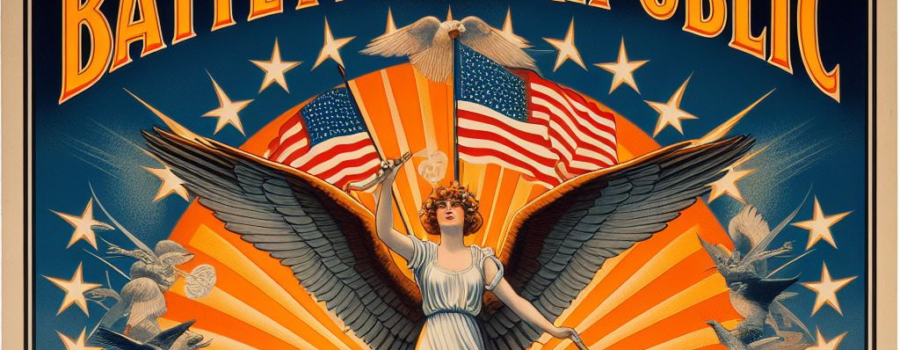I’d like to talk about something today that means America. It means the very foundation of the nation that we stand within and are proud to be a part of: faith, not just in God, but in the righteous cause of freedom.
On the 18th of November, 1861, a very devout woman named Ms. Julia Ward Howe awoke in the middle of the night, so late that it could be called morning, and as the sun rose over Washington, so rose these words in her mind, almost as if guided by another force, and she wrote them down right then and there: “Mine eyes have seen the Glory of the coming of the Lord… He is trampling out the vintage where the grapes of wrath are stored…” I’m sure you know the rest.
Initially, the tune that you all know (hum) was part of a hymn, called “Oh! Brothers.” But the work that Ms. Howe drew much of her inspiration from on that night in 1861 was a Civil War marching song, written by members of the Second Infantry Battalion of the Massachusetts militia. That familiar tune was paired with lyrics about a man who “lies a-mouldering in the grave,” John Brown. A man who fought his own war against an evil that betrayed the ideals of what I have said America to be. That evil was slavery. John Brown, a devout man, believed that slavery was the greatest threat to America being one nation, under God, indivisible, with liberty and justice for all.
Ms. Howe took those lyrics and changed them according to her own faith, and one of those snippets, the Grapes of Wrath, became the title for a well known novel by American author John Steinbeck. For those of faith, that phrase comes from Revelation 14:19-20, which inspired the traditional image of Christ in the winepress:
“And the angel thrust in his sickle into the earth, and gathered the vine of the earth, and cast it into the great winepress of the wrath of God. And the winepress was trodden without the city, and blood came out of the winepress, even unto the horse bridles, by the space of a thousand and six hundred furlongs.” (Revelations 14:19-20 KJV)
Another lyric refers to Christ’s suffering upon the cross: “As he died to make men holy/let us die to make men free.” This nation has raised generations upon generations of young men and women who were fully willing and ready to follow this notion and to die for our freedom. Freedom has never been free, and the death of those with faith, not just in God, but in what they believed in, is the price. In the words of John Brown immediately before his death, “the crimes of this guilty land will never be purged away, but with Blood.” To break sin, to defend righteousness, blood must be shed. For peace to prevail, first must war burn the earth, but not salt the ground.
In the same spirit as Brown’s crusade, various organizations promoting unity, solidarity, faith, and freedom adopted the tune with their own lyrics. The Marching Song of the First Arkansas Colored Regiment is a testament to the enduring will of former slaves, and their resolve to “[fight] for the union, [fight] for the law.” Blood Upon the Risers is a morbid version designed by American paratroopers in World War II about a “rookie trooper, who surely shook with fright,” who, upon dying to a parachute failure, “ain’t gonna jump no more.” Solidarity Forever, a popular song of the trade unions, puts forth concepts relating to the strength of unity, and comments upon such groups that “the union makes [them] strong.” In Ireland, the struggle for freedom from British oppression produced a song about the camaraderie of the West Belfast Battalion of the Irish Republican Army during the 1919-1921 Irish War of Independence, as the unionist Viscount Craigavon, upon inciting sectarian conflict, “got a rude awakening/when with rifle and grenade/ he met the fighting First Battalion of the Belfast Brigade.”
Those words, and the ideas put forth in this song, of freedom, of patriotism, of faith, and of unity have guided Americans for centuries. Though the words were penned in the 1860s, those ideals have guided Americans through their nation’s founding, and led young men, and more recently, young women, to live, fight, and die for their faith in a cause, or a nation, or a people they believed in. Those ideals guided Americans against the British in our fight for Independence and freedom, and again when that independence and that freedom was challenged in 1812. They guided Americans against their brothers and sisters in the North or South in the 1860s. Those words guided thousands of Americans across the world, to return justice in Europe, at the Somme, Belleau Wood and the Argonne during the First World War. They guided our young men to defend their nation after the 7th of December, 1941, during the Second World War; to fight both in the West against Hitler’s oppression, on the beaches of Normandy, at the Bulge, and in the enemy’s home, Berlin, and also in the East against Japanese aggression, at Midway, Leyte Gulf, and Okinawa.
For better or for worse, those words also brought American boys to lands far from home, where tens of thousands of Americans died, faithful to the last, in Korea, in a faraway place called Vietnam, and more recently in the Middle East, in Iraq and Afghanistan.
The meaning of America also brought our freedom to new levels with the Civil Rights movement in the 1960s, and that meaning, that pride, that faith, that freedom, that unity, that dream has made America the land of the golden streets, the Shangri-La, the home of opportunity that has brought millions across the world to her, including both mine and blexas enjoyer’s parents.
The Battle Hymn of the Republic, with other American songs, like Dixie, America the Beautiful, and dozens of others, reflect the indomitable, fierce, and fearless American spirit that makes this nation the greatest on God’s earth. In each of these wars, and until today, American men and women are renowned for the ferocity, the bravery, the fortitude, and the skill with which they fight, following “the trumpet that shall never call retreat”, and each of those “hero[es], born of woman, [have crushed] the serpents [of the evil they fought against] with their heel[s],” the serpents that threatened the freedom of their families and their beloved nation. Those heroes, proved in liberating strife, who more than self, their country loved, truly are the spirit of America. Through those men and women, who followed words like those written by Howe, by the Second Massachusetts Infantry Battalion, America, which once was lost, has been found. This is a land where old times are not forgotten, and through faith, whether it be in God, or country, or any cause one believes in, freedom may be had.
God bless America and thank you,
Constitution Enjoyer
Quotes and references from and to: John Brown’s last words, the Battle Hymn of the Republic, Dixie, America the Beautiful, Blood Upon the Risers, the Marching Song of the First Arkansas, Belfast Brigade, the King James Bible, the Pledge of Allegiance, and Amazing Grace.




Most Commented Posts